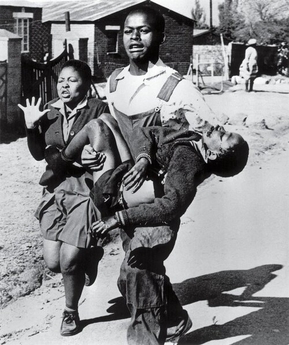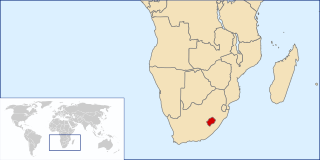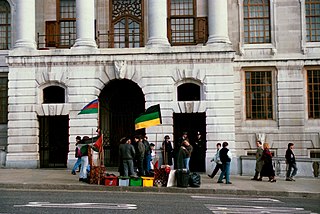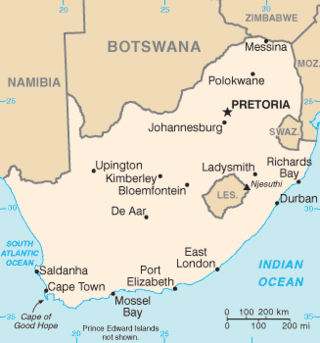
The Soweto uprising, also known as the Soweto riots, was a series of demonstrations and protests led by black school children in South Africa during apartheid that began on the morning of 16 June 1976.

United Nations Security Council Resolution 134, adopted on April 1, 1960, was passed after a complaint by twenty-nine Member States regarding "the situation arising out of the large-scale killings of unarmed and peaceful demonstrators against racial discrimination and segregation in the Union of South Africa". The Council recognized that the situation was brought about by the policies of the government of the Union of South Africa and that if these policies continued they could endanger international peace and security.

United Nations Security Council Resolution 282, adopted on July 23, 1970, concerned by violations of the arms embargo passed against South Africa in Resolution 181, the Council reiterated its total opposition to the policies of apartheid and reaffirmed its previous resolutions on the topic. The Council called upon states to strengthen the arms embargo by ceasing the provision of military training to members of the South African armed forces and by taking appropriate action to give effective to the resolution's measures.

United Nations Security Council Resolution 311, adopted on February 4, 1972, after reaffirming previous resolutions on the topic and noting the continued military build-up by South Africa, the Council condemned the policy of apartheid and recognized the legitimacy of the struggle of the oppressed people of South Africa.

United Nations Security Council resolution 591, adopted unanimously on 28 November 1986, after recalling resolutions 418 (1977), 421 (1977), 473 (1980) and 558 (1984), the Council strengthened the mandatory arms embargo against apartheid South Africa imposed by Resolution 418, and made it more comprehensive. Resolution 591 sought to clarify vague terms from previous resolutions on the topic.

United Nations Security Council Resolution 385, adopted unanimously on January 30, 1976, recalled previous resolutions on the topic as well as an advisory opinion of the International Court of Justice that South Africa was under obligation to withdraw its presence from the Territory of Namibia. The Resolution reaffirmed the United Nations' legal responsibility over Namibia, expressed its concern over the continued illegal actions of South Africa and deplored the militarization of Namibia.

United Nations Security Council Resolution 387, adopted on March 31, 1976, reaffirmed the principle of a state's right to territorial integrity in the face of South African incursions into Angolan territory. The Council recognized the international disturbance at South Africa's actions and expressed its concern over them. The Resolution condemned South Africa's actions and demanded that it respect the territorial integrity of Angola. The Council further demanded that South Africa desist from using the "international Territory of Namibia" to mount provocative or aggressive acts against other states and called upon the South African government to meet Angola's just claims for compensation.

United Nations Security Council Resolution 402, adopted on May 25, 1977, after recalling Resolution 402 (1976), the Council noted with concern the continued harassment of the people of Lesotho by South Africa in violation of the resolution. It also recognised the burden that had been placed upon Lesotho with regard to its decision not to recognise the "independent" bantustan Transkei by South Africa.

In United Nations Security Council Resolution 417, adopted on October 31, 1977, after reaffirming Resolution 392 (1976), the Council condemned the continuing repression against black people and other opponents of apartheid, as well as the South African media and the mounting deaths of detainees. The Council foresaw that the continuation of such activities would lead to serious racial conflict with international repercussions.

United Nations Security Council Resolution 428, adopted unanimously on May 6, 1978, after hearing representations from the People's Republic of Angola, Zambia and the South West Africa People's Organisation (SWAPO), the Council reminded Member States to refrain from using threats and use of force in their international relations. Reiterating Resolution 387 (1976), the present resolution condemned South Africa for its armed invasion of Angola via South West Africa (Namibia).

United Nations Security Council resolution 473, adopted unanimously on 13 June 1980, after recalling resolutions 392 (1976), 417 (1977), 418 (1977), 454 (1979) and 466 (1980) and letters from the Committee for South Africa, the council expressed its concern and condemned South Africa for the killing of protesters, including schoolchildren, opposed to apartheid.

United Nations Security Council Resolution 535, adopted unanimously on June 29, 1983, after examining the report of the Mission to Lesotho commissioned in Resolution 527 (1982), the Council reaffirmed its opposition to apartheid, commending Lesotho for providing sanctuary to refugees from South Africa.

United Nations Security Council resolution 539, adopted on 28 October 1983, after hearing a report from the Secretary-General and reaffirming resolutions 301 (1971), 385 (1976), 431 (1978), 432 (1978), 435 (1978), 439 (1978) and 532 (1983), the council condemned South Africa's continued occupation of Namibia, then known as South West Africa, and the tension and instability prevailing in southern Africa as a result.

United Nations Security Council resolution 560, adopted unanimously on 12 March 1985, after recalling resolutions 473 (1980), 554 (1984) and 556 (1984), the council condemned the continuing repression of anti-apartheid activities in South Africa, noting that the repression would undermine the possibility of a peaceful solution.

United Nations Security Council resolution 566, adopted on 19 June 1985, after recalling resolutions 269 (1969), 276 (1970), 301 (1971), 385 (1976), 431 (1978), 432 (1978), 435 (1978), 439 (1978), 532 (1983) and 539 (1983), the Council expressed concern at the tension and instability caused the continued occupation of Namibia by South Africa, noting the apartheid policies implemented in the territory and that the territory was used as a springboard for attacks on other southern African countries.

United Nations Security Council resolution 577, adopted unanimously on 6 December 1985, after reaffirming Resolution 571 (1985), the Council endorsed a report by the Security Council Commission of Investigation, condemning the regime in South Africa for its continued and unprovoked attacks against the People's Republic of Angola through the occupied territory of South West Africa.

United Nations Security Council resolution 601, adopted on 30 October 1987, after recalling resolutions 269 (1969), 276 (1970), 301 (1971), 385 (1976), 431 (1978), 432 (1978), 435 (1978), 439 (1978), 532 (1983), 539 (1983) and 566 (1985), the council again condemned South Africa for its continued "illegal" occupation of Namibia and its refusal to comply with previous resolutions.

United Nations Security Council resolution 765, adopted on 16 July 1992, after recalling resolutions 392 (1976), 473 (1980), 554 (1984) and 556 (1984), the council condemned the escalating violence in South Africa, in particular the Boipatong massacre on 17 June 1992, which resulted in the deaths of 46 people, and the suspension by the African National Congress (ANC) of bilateral talks with the South African government.

United Nations Security Council resolution 919, adopted unanimously on 25 May 1994, after recalling all resolutions on South Africa, in particular resolutions 282 (1970), 418 (1977), 421 (1977), 558 (1984) and 591 (1986), the Council welcomed the recent general elections and new government and decided, under Chapter VII of the United Nations Charter, to terminate the arms embargo and all other restrictions against South Africa.
The 1973 United Nations International Convention on the Suppression and Punishment of the Crime of Apartheid was the first binding international treaty which declared the crime of apartheid and racial segregation under international law. It was adopted by the General Assembly on 30 November 1973 and came into force on 18 July 1976. It passed by 91 votes in favor, four against and 26 abstentions. 110 countries are currently parties to the convention, with 26 signatories.













